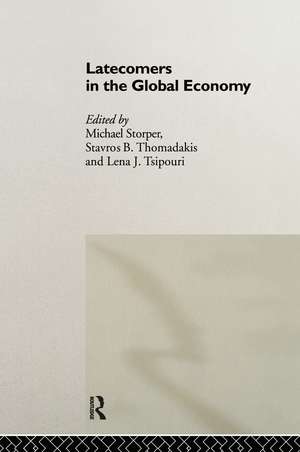Latecomers in the Global Economy
Editat de Michael Storper, Stavros Thomadakisen Limba Engleză Hardback – 26 feb 1998
With contributions from some of the best-known economists currently working in this area, the book will be a valuable guide for economists and international policy-makers interested in development issues.
| Toate formatele și edițiile | Preț | Express |
|---|---|---|
| Paperback (1) | 450.78 lei 6-8 săpt. | |
| Taylor & Francis – 2 dec 2014 | 450.78 lei 6-8 săpt. | |
| Hardback (1) | 1282.01 lei 6-8 săpt. | |
| Taylor & Francis – 26 feb 1998 | 1282.01 lei 6-8 săpt. |
Preț: 1282.01 lei
Preț vechi: 1563.43 lei
-18% Nou
Puncte Express: 1923
Preț estimativ în valută:
245.39€ • 266.64$ • 206.26£
245.39€ • 266.64$ • 206.26£
Carte tipărită la comandă
Livrare economică 21 aprilie-05 mai
Preluare comenzi: 021 569.72.76
Specificații
ISBN-13: 9780415148672
ISBN-10: 0415148677
Pagini: 344
Dimensiuni: 156 x 234 x 21 mm
Greutate: 0.73 kg
Ediția:New.
Editura: Taylor & Francis
Colecția Routledge
Locul publicării:Oxford, United Kingdom
ISBN-10: 0415148677
Pagini: 344
Dimensiuni: 156 x 234 x 21 mm
Greutate: 0.73 kg
Ediția:New.
Editura: Taylor & Francis
Colecția Routledge
Locul publicării:Oxford, United Kingdom
Public țintă
PostgraduateNotă biografică
Michael Storper, Stavros Thomadakis, Lena Tsipouri
Cuprins
Introduction; Part I: Theoretical foundations; 1: Industrial policy for latecomers: Products, conventions, and learning; 2: Globalization tendencies relevant for latecomers: Some conceptual issues; 3: Principles of an operational industrial policy for latecomers: Failures of analogy, strategies, and degrees of freedom; Part II: Policies, instruments and agents; 4: Coordinated industrialization: Institutional agendas for less favored countries; 5: Implications of organizational learning for horizontal technology policies: An exploratory study; 6: Industrial policy, competitive strategy, and networks of small and medium-sized firms: Theoretical issues and implications for less favored countries; 7: The regional development potential of inward investment 1; Part III: Case studies; 8: Learning, innovation, and industrial policy: Some lessons from Korea; 9: Industrial policy for catching up: The case of Taiwan; 10: Industrial policy in Ireland and the problem of late development; 11: Promoting coordination at regional level: The case of Northern Greece 1; 12: Inward investment in Central and Eastern Europe: The compatibility of objectives and the need for an industrial strategy
Descriere
Drawing on the example of late-developing countries, especially from East Asia, catching up with established economic powers, the authors address a new formulation of industrial policy for latecoming, semi-industrialized countries.









